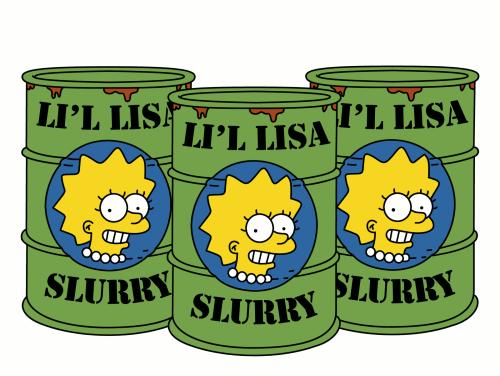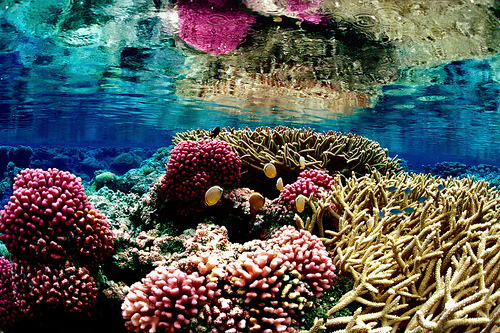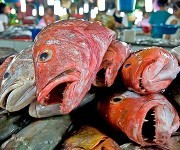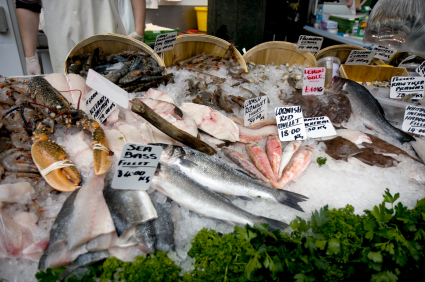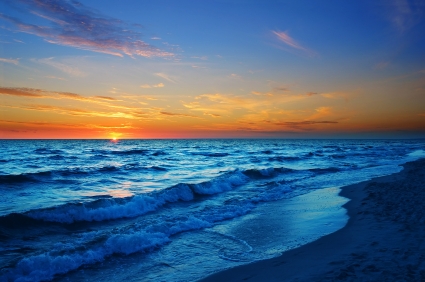overfishing
-
Take a look at what we’ve done to fish populations
This image from Information is Beautiful (click to embiggen) shows the biomass of popularly-eaten fish (bluefin tuna, striped bass, all the ones you normally see in restaurants) in the northern Atlantic. On the left is 1900 — look at all that blue! Blue means 11 or more tons of fish in a given area. On […]
-
Protect the coral reefs — the life you save might be your own
Photo: U.S. Fish & Wildlife Service — Pacific RegionCoral reefs are in big trouble worldwide — and that’s not just bad news for snorkelers. It could mean death instead of life for millions of people … maybe even you. Here’s why: Coral already provides the elemental compounds for a growing number of crucial medicines and […]
-
Everyone wants a piece of Belize
One day in December, the residents of the seaside village of Punta Gorda in Belize looked out to the horizon and saw something unexpected: Jamaican fishing boats. They had arrived, unannounced and without permits, to fish in Belize’s diverse waters. Many of Punta Gorda’s local fishermen still work the shallow waters inside the Belize Barrier […]
-
The earth’s decade
Generations from now, long after the last Twitter follower has unfriended the last Facebook user, this decade will be remembered and felt for its impact on Nature: the species that were saved and those that were lost; the heating of the planet; the forests cut down and those that remain to provide oxygen to our […]
-
What’s in a name? For the slimehead and toothfish, a makeover leads to rampant overfishing
“If the slimehead were still a slimehead, it wouldn’t be in this kind of trouble,” begins a good WashPost story today on overfishing of the Orange roughy and other fish with popular nom de plumes. As lakes and oceans have been depleted by heavy fishing, the seafood industry tried to dress up what was left […]
-
A new tool for navigating around overfishing and mercury taint
Chart by Neil Banas. Here’s a PDF version. Not long ago, I arrived at a fishmonger (Carrboro, N.C.’s Tom’s Seafood) just before closing time looking for a main course — preferably one that didn’t wouldn’t contribute to stripping the oceans bare or addle my tired brain with lashings of mercury (courtesy of coal-fired power […]
-
Oceans’ alarm: what the sea is trying to tell us
Recently, I read about a professor at Columbia who teaches a course about the signs of the apocalypse. With the financial collapse and threats of a swine flu pandemic in mind, he told the New Yorker he decided to create the class because “now seemed like a good time.” I don’t know if Professor Taussig’s […]
-
Environmental Organizing as Solution to Family Discord
This weekend, The New York Times Magazine ran as its cover story an article entitled “Why Isn’t the Brain Green?” (i.e. why humans don’t generally make environmental choices automatically, even though it’s good for us in the long term). And a front page Monday story in The Washington Post, chronicled how “going green” could lead […]
-
The Fishery That's Too Big to Fail
This is a guest post by John Hocevar and Jeremy Jackson. Jeremy Jackson is the William E. and Mary B. Ritter Professor of Oceanography at the Scripps Institution. John Hocevar is a marine biologist and the director of Greenpeace’s oceans campaign. If you like seafood, you’ve probably eaten Alaska pollock, the tender white fish used […]
